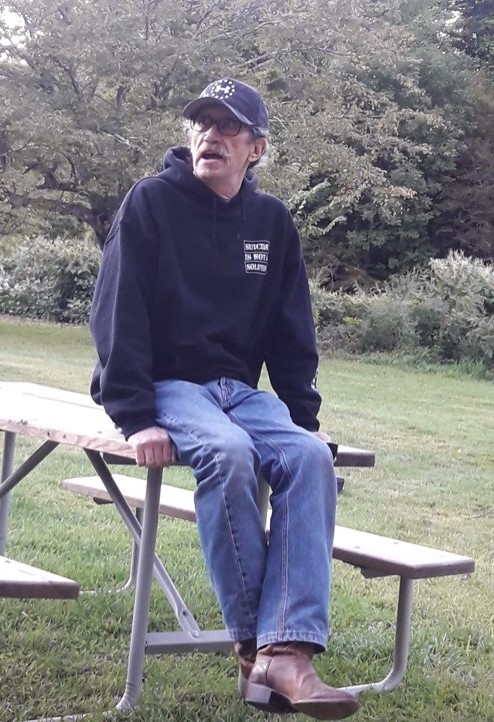
Chuck Andreas shared his personal story during the Hop & Remembrance event. PHOTO BY PAT FARNELLI
Representatives from many local and regional human services agencies joined with the Susquehanna County Commissioners and the Lackawanna-Susquehanna Behavioral Health/ Intellectual Disabilities/ Early Intervention Program for an evening of Hope and Remembrance Friday, Sept. 18 at the Williams Pavilion, Salt Springs Park in Franklin Township.
There the county commissioners joined event organizers to welcome the public to join in on remembering those lost to suicide; hear stories from survivors that offer hope; and learn about resources available that can help someone that is struggling at this time.
The Williams Pavilion is an open-air structure, with limited seating, and social distancing was possible, and face masks were worn.
Pastor Bob Kadlecik from Bridgewater Church said, “Satan is described in the Bible with chilling imagery, stalking whom he may devour. Isolation is affecting many of us these days. We don’t want anyone to feel alone.”
Commissioner Elizabeth Arnold said, “This topic of suicide is close to my heart. I’ve had relatives take their own lives. Mental illness can reach anyone and everyone.”
She continued, “The other day, I was having a tough day, and someone sent me a photo of a baby touching some flowers I had sent and said ‘Baby loves these flowers,’ and that made my day. Sometimes, just a small word of encouragement or greeting can make a difference.”
Arnold said the commissioners have been publicizing services that are available to county residents dealing with stress and mental health issues, and a billboard erected on Route 706 – located just east of Montrose – carries a message of hope.
Commissioner Alan Hall offered, “We have a unique situation at our courthouse in how we decide who does the things that we do. I talked to the other commissioners and courthouse staff back when the COVID-19 situation started, and I said, this is going to be a tough year for a lot of people. Pastor Bob said he’d be glad to take a phone call, and so would we. If you know people who are struggling, reach out to them. It’s gonna be a while before we can get the socialization we are used to. Please contact people.”
Commissioner Judy Herschel said that in 1996 she lost a dear friend to suicide. “This person was well-liked, funny, and had never received any mental health services. Family and friends were left behind filled with confusion and guilt. In retrospect, there were warning signs. As a way of remembering my friend with love, I’d just like to say, just asking, ‘Are you okay?’ goes a long way. I’ve learned not to judge anyone for how they feel. Mental illness can happen to anyone.”
The first guest speaker, Kelly Luce, introduced herself as a survivor of suicide loss. She said that her story began in October 2013. She had moved from the school district, so her son stayed with his father during the school week to continue attending school in Montrose. She kissed him goodbye on Monday, Oct. 28, 2013. “On Thursday morning about 7 a.m. my ex-husband called. I didn’t answer. I thought, ‘What could be that important?’ He called again. My father and my older child knocked on the door of my room. I answered the phone. ‘Scott killed himself this morning,’ he said.”
“His friends stood in a line for hours at the viewing. In the days leading up to the funeral, his friends were contacting me. They told me what was going on in his last days. It really helped to know all those kids loved him so much.”
“He was the master of logic. He would take his clothes into the bathroom, shower, and dress for the next day, and sleep in his clothes. ‘Why get up any earlier than I have to?’ he said. Little did I know that he was cutting in that bathroom.”
She explained that the autopsy report showed that her son had been cutting, and related that she did not know that until receiving the report, and said his siblings and friends had not known either. “That’s how we all found out.”
She said her son had not been doing anything to suggest he was planning to kill himself; he wasn’t giving his belongings away, was doing well in school. “He was planning ahead,” Luce said. “He was getting his snowboard ready for winter and doing a snow dance on the porch.”
He texted a goodbye to his girlfriend, and two minutes later, he pulled the trigger, Luce told the crowd.
She also spoke about what she has done since that day. “I can’t get my son back. So I got myself certified in Mental Health First Aid,” she said, working with a non-profit group at Binghamton University.
“I have a thought I go back to over and over: You don’t have to make it through another day. You don’t really even have to make it through another hour. Just try to get through the next 10 minutes.”
“My hardest time is the morning. If you feel alone and you don’t want to burden your loved ones, my phone is on 24/7, and my number is on my business cards,” Luce said.
Speaker Chuck Andreas introduced himself as a suicide survivor. “It’s considered a taboo, not discussed outside your family circle,” he said. Also employed at Binghamton University, he overheard someone talking about student suicide and saying the person “took the easy way out.”
Andreas responded, “That’s not how it is,” adding that he was a suicide survivor and volunteer for Rock Against Suicide.
He recounted how he returned home one night after working second shift. “The house was empty,” he said. His wife had left him a note telling him he could stay with a friend; and the next day his bank account had been closed, car insurance canceled, and credit card maxed out.
“This is a really tough time of year,” Andreas said. “I wasn’t eating or sleeping. Maybe two hours of sleep on a good night. I got tremors, and I still have them to this day. The thought of suicide never entered my mind.”
After the break-up of his marriage, the room he was staying at was also the “gun room” in his friend’s home, Andreas said, “I went and got out a shotgun and chose a slug.”
He continued, “One of their kids opened the door, took five steps across the room, and said, ‘Chuck, what are you doing?’ Then he grabbed the gun, grabbed every loose gun in the room, took me out to the car, and sat with me in the car, and said, I’m not gonna leave you until you get help. They took me to the famous fifth floor in Binghamton hospital, took my shoelaces and belt, and kept me in a room for 30 days. When they let my mom come see me the hurt in her face is something I’ll never forget. I had never thought about hurting anyone, how what I was doing would hurt someone else.”
Andreas eventually fell in love and married again. He and his wife were inseparably close for 19 years and nine days, until her death. Once again, he battled with thoughts of suicide. “Triggers are important,” he said. “I know now that I am a suicidal person.”
A blogger on the healthcare community website, The Mighty (themighty.com) noted: “Suicide is a word that makes a lot of people uncomfortable. It is still not widely understood, and the fear of how someone might react to your confession of suicidal thoughts often keeps people from reaching out for help. Fear of people calling the police or forced hospitalizations are legitimate concerns for a lot of people who experience these thoughts.”
Resources are Available
Scranton Counseling Center: 570-278-6822; Crisis line: 1-844-348-6100
Suicide Prevention Lifeline: 1-800-273-8255
Text: HOME to 741741
Advocacy Alliance Warm Line: 1-866-654-8114, 6-10 p.m., every day
NEPA Community Healthcare
Greenfield Twp: 570-282-5189
Hallstead: 570-879-5249
Montrose: 570-278-7500
Integrative Counseling Services, New Milford: 570-465-2080
Or Dial 2-1-1

Be the first to comment on "An evening of Hope & Remembrance"